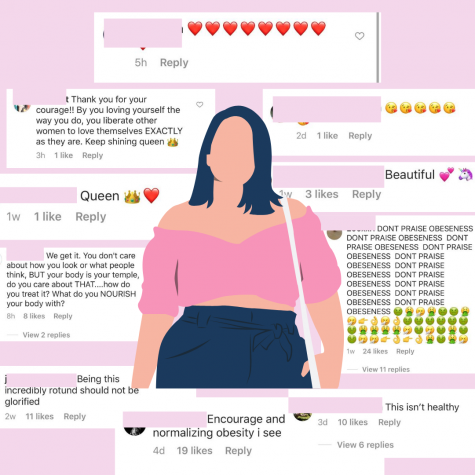No concerned trolling here
Concerned trolling is another form of fatphobia by promoting unhealthy and inaccurate views of weight. (Trigger Warning: Bullying, Eating Disorders)
Fatphobic concerned trolling occurs when people claim that someone is glorifying obesity by being fat. This is especially evident on social media when fat or larger celebrities post photos of themselves. Hateful comments claim that they should not normalize obesity or that they are a danger to their impressionable followers. Although trolls use health concerns to defend their actions, these comments are a dangerous form of fatphobia. By suggesting that someone’s weight determines their health, these comments enforce the false stereotype that only skinny people are healthy.

The biggest issue behind concerned trolling is that it equates weight with health. This way of thinking further drives people to eating disorders and unhealthy views of weight. A study done by JAMA Network found that in adults 20 and over, “51.3% of overweight adults and 31.7% of obese adults were metabolically healthy”. In contrast, 23.5% of normal-weight adults participating were metabolically abnormal (JAMA Network). This study suggests that one cannot necessarily always determine health based upon weight. However, this is exactly the type of thinking trolls promote.
Concerned trolls claim that people are encouraging being overweight by failing the societal expectation of being thin. Yet by posting confident photos of themselves these influencers are actually encouraging self love and confidence.
According to Polaris Teen Center, “50% of teenage girls and 30% of teenage boys use unhealthy weight control behaviors.” This includes skipping meals, not eating enough, over exercising, and more. Our society should show
more concern about raising healthy teens than thin teens. This includes exercising for overall growth and health benefits rather than for a weight goal. Children should be taught how to eat meals that will sustain their bodies and help them grow instead of counting calories and suggesting that everything “goes straight to your thighs.”
In a time where teens are scared of gaining the “Corona 15,” plus sized representation is a weapon against eating disorders and fatphobic culture. According to Huffpost, almost 50% of girls ages 3 to 6 express that they worry about being fat” (Huffpost). Women deserve to grow up in a world where their biggest fear isn’t gaining weight. Fat representation is necessary in order to show young people that existing outside of society’s beauty standards should be celebrated and not feared.
If fat representation is “glorifying obesity,” then let’s glorify it.





Ms Barbre • Sep 10, 2020 at 6:30 pm
Nice, Evelyn.